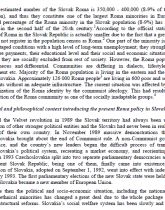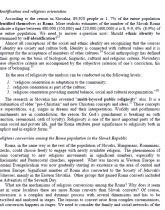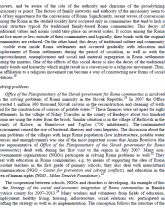Hľadaj
Zobraz:
Univerzity
Kategórie
Rozšírené vyhľadávanie
45 146
projektov
Identification and Religious Orientation of the Roma in the Slovak Republic
| Prípona |
Typ poznámky |
Stiahnuté 0 x |
| Veľkosť 0,1 MB |
Jazyk anglický |
ID projektu 8348 |
| Posledná úprava 23.02.2018 |
Zobrazené 1 875 x |
Autor: dianna |
 Zdieľaj na Facebooku
Zdieľaj na Facebooku |
||
| Detaily projektu | ||
- cena:
5 Kreditov - kvalita:
96,9% -
Stiahni
- Pridaj na porovnanie
- Univerzita:Univerzita Mateja Bela v Banskej Bystrici
- Fakulta:Pedagogická fakulta
- Kategória:Humanitné vedy » Teológia
- Predmet:Misiológia so zameraním na rómske komunity
- Študijný program:-
- Ročník:2. ročník
- Formát:PDF dokument (.pdf)
- Rozsah A4:9 strán
The estimated number of the Slovak Roma is 350,000 - 400,000 (8-9% of the entire population), and thus they constitute one of the largest Roma minorities in Europe. The estimated percentage of the Roma minority in the Slovak population (8-9%) has increased fourfold in the second half of the 20-th century.According to the official statistics, the number of Roma in the Slovak Republic is actually smaller due to the fact that a great deal of them did not register in the population census as Roma. One part of the minority is living in disadvantaged conditions with a high level of long-term unemployment; they strongly depend on welfare payments, their educational level and their social and economic situation is very low, and they are socially excluded from rest of society. However, the Roma population is heterogeneous and differential. Communities are differing in dialects, lifestyle, human environment etc. Majority of the Roma population is living in the eastern and the southern part of Slovakia. Approximately 126 000 Roma people are living in 600 poor and segregated settlements without an adequate infrastructure. The current situation was affected by the past marginalization of the Roma identity by the communist ideology. This had resulted in the classification of the Roma community as one of the socially inadaptable groups.
Kľúčové slová:
misiológia
rómska komunita
minorita
orientácia
náboženstvo
vybrané obce
Obsah:
- Historical and philosophical context introducing the present Roma policy in Slovakia
The European dimension and education
Ethnicity of the Roma and integration into the society
Law on the use of national minority languages
Ethnicity - Confession - Identity
Identification and religious orientation
Religious conversion among the Roma population in the Slovak Republic
Solving problems
Zdroje:
- BACOVÁ, V. Etnická identita a historické zmeny. Štúdia obyvatelov vybraných obcí Slovenska. Bratislava : Veda, 1996. p. 12.
- BARANY, Z. The East European Gypsies. Regime Change, Marginality, and Ethnopolitics. Chapter 5- The Socioeconomic Impact of Regime Change. Demography. Cambridge: Cambridge University Press, 2002.
- Co sa osvedcilo? Výber z rómskych projektov v strednej a východnej Európe. Bratislava : Partners for Democratic Change Slovakia, 2003. ISBN 80-968934-1-6.
- JAURA, D. Young People in Postmodern Society: A survey of spirituality of the coming generation in post-communist Europe. Bratislava : CityGate, 1997. 44 p.
- KOVÁC, M.; JURÍK, M. Religiozita Rómov a aktivity cirkví vo vztahu k Rómom. In
- KOVÁC, M.; MANN, A. B. eds. BOH VŠETKO VIDÍ. Duchovný svet Rómov na Slovensku. Bratislava : Chronos, 2003. p. 17-35. ISBN 80-89027-06-7
- KUŠNIERIKOVÁ, N. ed. Rómovia, vzdelávanie, tretí sektor. Bratislava : PDCS, 2001.
- LIVECCHE, M. Every Knee Shall Bow : An Inquiry into What Masters Us. Bratislava : CityGate, 2004. 77 p.
- NOBLE, I. Churches in the Post-Communist Countries and Democratic Citizenship. In Europe, Democratic Citizenship and Education. Otepää : ICCS, 2006. 14 p.
- RADICOVÁ, I. Hic Sunt Romales. Bratislava : S.P.A.C.E., 2001.







